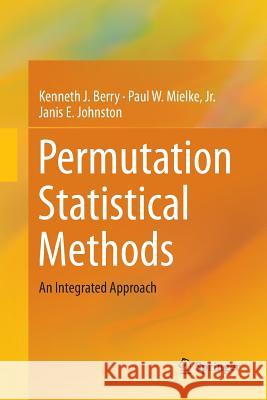Permutation Statistical Methods: An Integrated Approach » książka
topmenu
Permutation Statistical Methods: An Integrated Approach
ISBN-13: 9783319804194 / Angielski / Miękka / 2018 / 622 str.
Kategorie:
Kategorie BISAC:
Wydawca:
Springer
Język:
Angielski
ISBN-13:
9783319804194
Rok wydania:
2018
Wydanie:
Softcover Repri
Ilość stron:
622
Waga:
0.88 kg
Wymiary:
23.39 x 15.6 x 3.3
Oprawa:
Miękka
Wolumenów:
01
Dodatkowe informacje:
Wydanie ilustrowane











